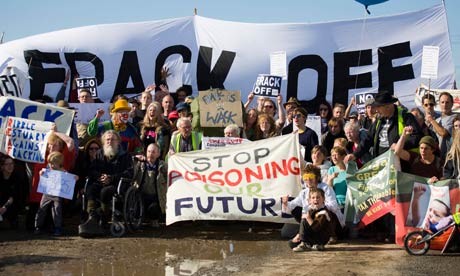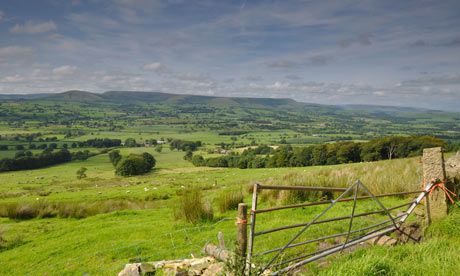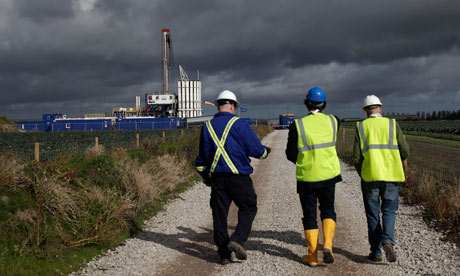Fuel companies say drilling for shale gas is safe, clean and could meet our energy needs for 100 years. So why are people so worried about earthquakes and pollution?

"It was just like something from Nasa," says Doreen Stopforth, pointing from the front window of her bungalow to the flat expanse of cabbages and the River Ribble beyond. one day last year, an enormous drilling rig materialised in the fields. It was not the visual blot on their landscape that bothered Stopforth and other residents in rural Lancashire: it was what was going on underground. Hesketh Bank was being prepared for fracking – mining shale gas by injecting water, sand and chemicals into rocks far below ground.
Hydraulic fracturing, or fracking, is the new bete noire of conservationists, who condemn it as a dirty and desperate attempt to grab the last fossil fuels from inaccessible rocks in unsuitable locations. In the US, where fracking began and has prospered, it was revealed this month that Matt Damon will star in an anti-fracking film, following on from the Oscar-nominated documentary Gasland, which exposed widespread pollution in fracking hotspots such as Pennsylvania. But North American horror stories of fracking polluting the aquifers that hold drinking water were dramatically trumped in the UK last spring when one of the first shale gas fracking operations on British soil was halted after it triggered two earthquakes close to Blackpool. The fracking at Preese Hall, a well the size of a football pitch by the Blackpool North railway line, caused tremors measuring 2.3 and 1.5 on the Richter scale.
Despite calls for a moratorium on fracking and growing opposition, including Frack Off activists twice scaling a drilling rig in Lancashire, Britain will soon be open for fracking once again. The first official scientific inquiry into the practice in Britain this week recommended that fracking can continue if new safety measures are enforced, including a "traffic light" system in which fracking is halted if it triggers tremors of 0.5 or above. Fracking is likely to become a key part of a second "dash for gas" as the country searches for cheaper energy and a secure replacement for dwindling North Sea supplies.
Supporters claim fracking will herald an age of cheaper gas – in the US, shale gas accounts for a quarter of the country's gas industry and fracking has helped cut gas prices by 25% in the four years to 2012 – and liken it to keyhole surgery, its operations virtually invisible above ground, unlike destructive mining and intrusive wind power. Dismissing fracking fears as comparable to scaremongering over GM crops, frackers are eyeing up all corners of Britain, including Kent, Hampshire, North Yorkshire, Scotland and the Bowland Basin in Lancashire, where the gas is found far below ground.
The shale of the Bowland Basin lies beneath picturesque rolling fields and villages tucked between Preston and Blackpool in Lancashire.Cuadrilla, one of four companies with a permit to search for (and eventually frack) shale gas in Britain, has six sites here, including Preese Hall: three have been drilled in preparation for fracking, with consent in place to drill three more. If it finds good supplies, Cuadrilla could create 2,500 jobs and construct 80 well pads in the area, each stretching for miles underground. Lord Browne, the former chief executive of BP, believes Lancashire could become the fracking capital of Europe, with the industry creating 50,000 jobs.
Fracking begins with the drilling of a well, often as deep as 3km. When shale deposits are reached, drilling turns horizontally through the shale. once drilled, water, sand and a small quantity of chemical lubricants are pumped in at high pressure, fracturing the brittle shale and forcing the naturally occurring gas out of pores in the rock. The sand fills the pores and stops them collapsing; the gas is returned to the surface via the well, along with some water contaminated with fracking chemicals and naturally occurring pollutants, including low-level radiation.
As the dash for fracked gas begins, many local residents in Lancashire are nervous. Doreen Stopforth has lived in her home with her husband John for 39 years. The dark, fertile soils around the Ribble estuary are called the salad bowl of England. "For us, personally, it's a nightmare," she says. "They go for miles underground breaking the shale and then we found out that the backflow – the chemicals and the water that comes out – is only 25% of what they put in. Where is it going? They say it won't leak into the aquifer – how do they know? I just don't trust them. What do they leave behind? We don't know if the land is going to be soured."
Cuadrilla stresses that the tremors triggered by fracking at Preese Hall were miniscule. Gayzer Tarjanyi, who lives near Blackpool, is not so sure: he was painting his gutters the day before the second tremor. The next day, he noticed fresh cracks in his home's gable end. His internal doors no longer shut properly: "The property has been moved about a bit," he says. Cuadrilla emphatically denies a local rumour that frackers hope to trigger quakes because these open up more fractures in the rock. According to the British Geological Survey, fracking does routinely create tiny tremors but these would normally be undetectable to humans. Professor Peter Styles, one of the authors of the independent scientific report on the Cuadrilla earthquakes, says: "We do not think you can categorically rule out other earthquakes, but we can categorically say that they are unlikely to be big." A new study by the US Geological Survey says a six-fold increase in small earthquakes in mid-America may be linked to oil and gas production, including fracking, since the end of the last century.
 The Bowland Basin in Lancashire, where energy exploration company Cuadrilla has six drill sites. Photograph: Alamy
The Bowland Basin in Lancashire, where energy exploration company Cuadrilla has six drill sites. Photograph: AlamyFracking's champions claim that shale gas could meet Britain's gas needs for nearly a century. Predictably keen to talk up shale gas prospects, Cuadrilla estimates there are 200 trillion cubic feet of gas in Bowland shale alone. The British Geological Survey (BGS) estimates that just 5.3tn cubic feet of shale gas is recoverable, barely enough to meet current UK demand for two years. This is a vast disparity. Who is correct? Nigel Smith, petroleum geologist at the BGS, says its estimate was extrapolated from comparable shale areas in the US and actually Cuadrilla's figure may be more accurate because it is based on real UK data from its small number of drilled wells. The Bowland Basin is only a small part of Britain's shale; other shale basins in Scotland, the north and the south could yield more gas. But Smith cautions that much will not be recoverable because it will never be acceptable to frack in densely populated areas.
Shale gas could be big business and in Lancashire there is already a strong sense of the little guy not being listened to. At one Cuadrilla site, Hesketh Bank, planning permission for the temporary drilling rig was granted by Lancashire county council and a notice was stuck on a private track far from the main road. "It was so sneaky the way they did it," says Stopforth. "We feel a lot of this has been done in the dark," says Christine Dickinson, a fifth-generation farmer who runs an organic farm and caravan site by the Hesketh Bank well. Cuadrilla knows it must redouble its efforts to placate sceptical local communities. In Sussex earlier this year, its representatives were trounced by furious locals at a heated public meeting. So it has cleverly replaced potentially hostile group meetings with drop-ins at village halls, where friendly staff collar locals one-by-one.
Cuadrilla's open evening at Elswick village hall in Lancashire sees a very English non-confrontation. Cuadrilla employees mount their charm offensive inside; outside, members of Ribble Estuary Against Fracking(Reaf) and a new group, Resident Action on Fylde Fracking (Raff), proffer a petition. There was talk of a merger between the two local groups, "but we don't want to become Reaf-Raff," chuckles Ian Roberts of Raff. He is sceptical about Cuadrilla's information evenings. "It's just PR. It's 'we have consulted the local community', tick the box."
Inside, Eric Vaughan, Cuadrilla's chief operating officer, chats to curious locals. Mining shale gas has been a cottage industry in the US since 1821 and a form of fracking was first used in 1947; Vaughan began fracking in Pennsylvania in 1981. But fracking only really took off with the accidental discovery that water opens up shale cracks more effectively than exotic foams. Some of the pollution from fracking in Pennsylvania was bad practice, says Vaughan – incorrectly dug wells not properly sealed off from the aquifer. Other so-called pollution incidents are actually due to naturally occurring methane found in many water wells in the region. This explains scary YouTube clips of flaming tap water. Lancashire's geology is "much, much easier" to mine safely, believes Vaughan, because the gas is not as close to the aquifer. Independent geologists agree, and say there is little risk of pollution from deep fracking leaking into the aquifer far above it.
The problem, as Vaughan sees it, is the people. In the US, people are used to living near the country's 800,000 onshore gas and oil wells. In Britain, almost no one is familiar with a gas mine next door. And so hostility towards fracking is based on fear of the unknown, not science. "The science bit is easy. I can show you why it works, why it's safe, but it's all emotional and political," complains Vaughan, echoing the comments of Shell's chief executive, Peter Voser, who urged regulators not to take "emotional" decisions.
Ian Roberts insists the well-heeled members of Reaf and Raff are not Nimbys emotionally opposed to fracking; they simply want a independent impact assessment before fracking begins in earnest. Roberts argues that decisions on where to frack cannot be left with local council planners. "I don't think they are big enough on their own to say 'no'," he says. There will be a review of the risks of shale gas extraction by the Royal Society and the Royal Academy of Engineers this year but rather oddly the study group claims it will make no judgment about the suitability of the UK for fracking.
Despite the polarised debate, it is unarguable that the scientific understanding of the risks of fracking in the UK is incomplete. A review of the science by Texas University said groundwater contamination was not unique to fracking and also occurred in conventional oil and gas operations due to flawed well construction. The Texan researchers ruled that "surface spills" of fracking fluids posed a greater risk to groundwater than fracking itself. In short, the report implies that fracking is no more hazardous than conventional oil and gas operations. This is far from an unequivocal defence of fracking, but critics question its "independent" billing. The academics were led by Chip Groat, a respected former director of the US Geological Survey who is also a paid director of PXP, an oil and gas company that is engaged in fracking; Groat received $493,598 (£310,000) in 2008 and $308,300 (£192,000) in 2009 for his services.
Groat has acknowledged that a report by the US government's Environment Protection Agency (EPA) will negate his study's findings of no adverse environmental consequences unique to fracking – if the EPA's findings are confirmed by peer review. The EPA constructed two deep monitoring wells to sample aquifer water, which confirmed the presence of compounds from fracking and found that drinking water wells were "below established health and safety standards".
 Engineers at the Cuadrilla shale fracking plant at Hesketh Bank. Photograph: Matthew Lloyd/Getty Images Europe
Engineers at the Cuadrilla shale fracking plant at Hesketh Bank. Photograph: Matthew Lloyd/Getty Images EuropeMost of the concern has been over water pollution but a three-year study by the Colorado School of Public Health, published this year, found a number of potentially toxic petroleum hydrocarbons in the air near fracking sites in western Colorado. These included benzene (a known carcinogen), ethylbenzene, toluene and xylene. Effects, the study concluded, could include eye irritation, headaches, sore throats and difficulty breathing. "We also calculated higher cancer risks for residents living nearer to the wells as compared to those residing further [away]," the report said.
Who monitors possible air pollution from fracking in Britain? Fracking is currently controlled by a regulatory patchwork: local authorities supposedly check air quality, the Health and Safety Executive inspects well construction and the Environment Agency (EA) assesses any impact on water supplies. The EA can also monitor air pollution and use existing regulation to halt fracking if there is a pollution risk. It also regulates the removal of the polluted fracking backwash, another source of anxiety for local people given that this radioactive water is removed by road tankers – past villages and schools – before being placed in storage.
Is the current regulation inadequate for a fully fledged fracking industry? "Not necessarily," says Tony Grayling, head of climate change at the EA, who believes the regulatory system in the UK is "significantly more robust" than in the US. Grayling admits that the EA is still learning about fracking and doesn't yet possess "the information we need to give technical guidance to our staff to apply the powers we have in the right way". For instance, he says that EA staff do not yet know exactly what is the safe distance required between a fracking well and groundwater supplies. Is he satisfied British fracking has been safe so far? "What has happened so far has been well-managed from a risk perspective, but equally it's important we don't ignore the risks."
After meeting the frackers at Elswick village hall, residents are fairly evenly split. "It's a big Easter egg for the Americans," says David Angel. Easter egg? Angel explains that US landowners are paid for mining activity, whereas in Britain whatever lies underground belongs to the crown. With no landowners to pay, US fracking companies could make big money in the UK.
"I don't trust big companies and I don't trust government, but I also don't trust scaremongers," says another local to the petition-holding opponents. Others noticed that the antis are mostly the early retired; fracking is "of more benefit to working-age people," judges Paul Mercer. His wife Charity is writing her dissertation on fracking; she thinks the biggest hurdle for the nascent industry is that Britain is more densely populated than the US. Another problem may be philosophical: the advantage and great drawback of shale gas is that its operations are almost invisible – there is no heavy industry to offend us but we also can't see what is going on below our feet. So we must trust a mining company and its government regulators – and this kind of trust is in short supply.
Nigel Smith at the BGS is sceptical about frackers' claims that shale will herald an era of cheaper gas. Any great shale finds will simply replace the rapidly disappearing North Sea gas. But he believes that companies would be "foolish" not to follow the success of fracking in the US and predicts that every shale basin in Britain will be tested for the gas. What about pollution concerns? Smith thinks US pollution is not relevant. "It's a bit like saying BP had a problem [with oil pollution] in the Gulf of Mexico but they haven't had any problems at Wytch Farm, which is a very sensitive area in southern England," he says.
Ultimately, says Smith, it is about political choices. "We have just had 30 years of getting our gas from the North Sea, where it's not caused any problems to anyone. Well, those days are gone. If we still want to run gas central heating and run our cars we have to look to other sources." We could turn Britain into a landscape of hundreds of fracking wells or we could import it from the Middle East. What does Smith make of the green argument that this dash for gas simply postpones the day when we must invest in more expensive renewable energy? "I agree," he says drily. "In the end, we are going to run out of fossil fuels. I can't see there being another source of fossil fuels after this one."
Given the scientific evidence, are the Stopforths reassured? "No, I'm not reassured," says Doreen. "We've already had an earthquake in Blackpool, just over the water. You tell me when they have an earthquake, what are we opening up? The fracking, how do they know what they will disturb? What about my little grandson? What about future generations? To leave behind a mess like this for the next generation just to go for the last little bit of fossil fuel energy is just wrong."
'庫間 > 해외자료' 카테고리의 다른 글
| 100억이 먹기에 충분한 식량을 기르지만 여전히 굶주린다 (0) | 2012.04.30 |
|---|---|
| 고대의 농법이 사바나의 보존을 도울 수 있다 (0) | 2012.04.30 |
| Op-Ed: New Genetically Engineered Crops Fueling a “Chemical Arms Race” on Our Soil (0) | 2012.04.17 |
| 기후변화 이후 세계를 어떻게 먹여살리는가 (0) | 2012.04.17 |
| 지속가능한 육류에 대한 신화 (0) | 2012.04.17 |
